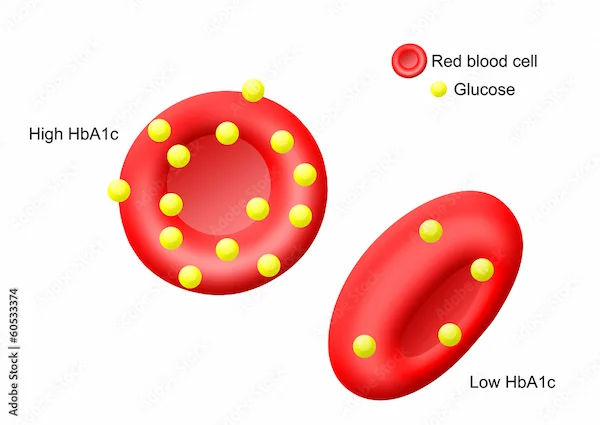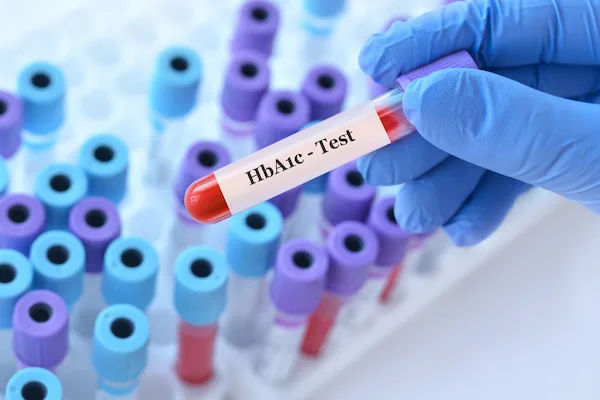Apple Cider Vinegar and Diabetes: Exploring the Benefits and Usage
Learn how apple cider vinegar may help manage diabetes by improving blood sugar control, enhancing insulin sensitivity, and supporting heart health. Explore its benefits, practical uses, and precautions for a diabetes-friendly diet.

Written by Dr Sonia Bhatt
Last updated on 3rd Jul, 2025
Apple cider vinegar (ACV) has garnered attention as a potential natural remedy for various health conditions, including diabetes. This versatile kitchen staple, known for its tangy flavour, may offer several benefits for individuals managing diabetes. In this article, we will delve into the science behind apple cider vinegar, its potential effects on blood sugar levels, and practical ways to incorporate it into a diabetes-friendly diet.
What is Apple Cider Vinegar?
Apple cider vinegar is made from fermented apple juice. The fermentation process involves two steps: first, yeast is added to apple juice to convert the sugars into alcohol. Then, bacteria are introduced to ferment the alcohol into acetic acid, the primary active ingredient in vinegar. This acetic acid is responsible for the distinctive taste and potential health benefits of ACV.
Unfiltered and unpasteurised apple cider vinegar contains the "mother," a cloudy substance composed of beneficial bacteria, enzymes, and proteins. The mother is believed to contribute to the vinegar's health-promoting properties.
Potential Benefits of Apple Cider Vinegar for Diabetes
Packed with acetic acid and antioxidants, ACV is widely regarded for its potential health benefits, particularly in managing diabetes. While not a replacement for medical treatment, ACV can complement diabetes care when used responsibly.
1. Blood Sugar Control
One of the most significant potential benefits of apple cider vinegar for people with diabetes is its ability to help control blood sugar levels. Several studies have examined this effect, with promising results:
Improved Insulin Sensitivity: Some research suggests that apple cider vinegar may improve insulin sensitivity, especially after meals. Improved insulin sensitivity means that the body's cells can better respond to insulin, the hormone that regulates blood sugar levels. This can lead to more stable blood sugar levels and reduced risk of blood sugar spikes.
Reduced Post-Meal Blood Sugar Levels: A study published in the journal Diabetes Care found that consuming apple cider vinegar before a high-carbohydrate meal significantly reduced post-meal blood sugar levels in participants with insulin resistance. The acetic acid in vinegar is believed to slow down the rate at which food leaves the stomach, leading to a more gradual absorption of glucose into the bloodstream.
Fasting Blood Sugar Levels: Another study found that taking two tablespoons of apple cider vinegar before bedtime led to a significant reduction in fasting blood sugar levels the next morning for participants with type 2 diabetes.
2. Lipid Profile and Heart Health
People with diabetes are at a higher risk of developing cardiovascular diseases. Apple cider vinegar may have a positive impact on lipid profiles, which can help reduce this risk:
Lower LDL Cholesterol: Some studies suggest that apple cider vinegar can help lower levels of low-density lipoprotein (LDL) cholesterol, often referred to as "bad" cholesterol. High levels of LDL cholesterol are associated with an increased risk of heart disease.
Improved HDL Cholesterol: Apple cider vinegar may also help increase levels of high-density lipoprotein (HDL) cholesterol, known as "good" cholesterol. Higher levels of HDL cholesterol are linked to a reduced risk of heart disease.
Triglyceride Levels: Triglycerides are another type of fat found in the blood, and high levels can increase the risk of heart disease. Some studies indicate that apple cider vinegar may help lower triglyceride levels.
3. Weight Management
Maintaining a healthy weight is crucial for managing diabetes, particularly type 2 diabetes. Apple cider vinegar may support weight management through several mechanisms:
Increased Fullness: Consuming apple cider vinegar with meals may increase feelings of fullness, helping to reduce overall calorie intake. This can be beneficial for weight management and blood sugar control.
Reduced Caloric Intake: By promoting satiety, apple cider vinegar may help individuals eat fewer calories throughout the day. This can contribute to weight loss or maintenance.
Fat Reduction: Some animal studies suggest that acetic acid, the main component of apple cider vinegar, may help reduce body fat accumulation.
4. Antioxidant Properties
Apple cider vinegar contains antioxidants, such as polyphenols, which can help combat oxidative stress in the body. Oxidative stress is linked to the development of diabetes-related complications, including neuropathy (nerve damage) and nephropathy (kidney damage). By reducing oxidative stress, the antioxidants in apple cider vinegar may help prevent or delay these complications.
5. Anti-Inflammatory Effects
Chronic inflammation is common in people with diabetes and can contribute to various health issues. Apple cider vinegar has anti-inflammatory properties that may help reduce inflammation in the body. Reducing inflammation is beneficial for overall health and may improve diabetes management.
Practical Ways to Incorporate Apple Cider Vinegar into Your Diet
Incorporating apple cider vinegar into your diet is both easy and beneficial. Here are some practical tips on how to include ACV in various meals and snacks throughout the day:
As a Salad Dressing: Apple cider vinegar makes a delicious and healthy salad dressing. Combine it with olive oil, lemon juice, and herbs to create a tangy vinaigrette. This combination provides a burst of flavour while supporting blood sugar control.
To Smoothies: Incorporate a small amount of apple cider vinegar into your morning smoothies for added health benefits. It can enhance the flavour and provide a boost of antioxidants and anti-inflammatory properties. Start with a teaspoon and adjust to taste.
Diluted in Water: One of the simplest ways to consume apple cider vinegar is to dilute 1-2 tablespoons in a glass of water and drink it before meals. This can help reduce post-meal blood sugar spikes and support overall blood sugar management. You can add a teaspoon of honey or a splash of lemon juice to improve the taste.
In Marinades: Marinate meats and vegetables in apple cider vinegar to add flavour and tenderise the food. This can be a tasty way to incorporate vinegar into your diet while reaping its health benefits.
In Soups and Stews: Add a splash of apple cider vinegar to soups and stews for a tangy flavour and added health benefits. It can enhance the taste and provide antioxidants and anti-inflammatory properties.
While apple cider vinegar is beneficial, it's important to practice portion control to avoid potential side effects. A typical serving size is 1-2 tablespoons diluted in a glass of water per day. Consuming it in moderation can help you enjoy its benefits without risking adverse effects such as tooth enamel erosion, throat irritation, or gastrointestinal discomfort.
Potential Side Effects and Precautions
Although apple cider vinegar offers several potential health benefits, it's essential to be aware of possible side effects and take necessary precautions:
Tooth Enamel Erosion: The acetic acid in apple cider vinegar can erode tooth enamel over time. To minimise this risk, always dilute ACV in water, drink it through a straw, and rinse your mouth with water afterwards.
Throat Irritation: Undiluted apple cider vinegar can cause throat irritation. Always dilute it before consumption.
Gastrointestinal Discomfort: Some people may experience digestive discomfort, such as nausea or indigestion, when consuming apple cider vinegar. Start with a small amount and gradually increase the dosage to assess your tolerance.
Medication Interactions: Apple cider vinegar may interact with certain medications, such as insulin or diuretics. If you are taking medication for diabetes or other health conditions, consult your healthcare provider before adding ACV to your diet.
Potassium Levels: High doses of apple cider vinegar may lower potassium levels in the body. Monitor your intake and consult your healthcare provider if you have concerns about your potassium levels.
Conclusion
Apple cider vinegar may offer several potential benefits for managing diabetes, including improved blood sugar control, enhanced lipid profiles, and support for weight management. Its antioxidant and anti-inflammatory properties further contribute to overall health. However, it's essential to consume apple cider vinegar in moderation and take necessary precautions to avoid potential side effects.
Always consult with a healthcare professional before making significant changes to your diet, especially if you have diabetes or other health conditions. With thoughtful incorporation and mindful consumption, apple cider vinegar can be a valuable addition to your diabetes management plan.
Consult Top Diabetologists
Consult Top Diabetologists

Dr Syed Mateen Pasha
General Physician
2 Years • MBBS
Bengaluru
PRESTIGE SHANTHINIKETAN - SOCIETY CLINIC, Bengaluru

Dr. Anand Ravi
General Physician
2 Years • MBBS
Bengaluru
PRESTIGE SHANTHINIKETAN - SOCIETY CLINIC, Bengaluru
Dr.rohit Afroz
General Physician
2 Years • MBBS.,MD (General Medicine)
Hyderabad
Apollo Sugar Clinic alkapuri colony, Hyderabad

Dr. Dhanraj K
General Physician/ Internal Medicine Specialist
25 Years • MBBS, MD Internal Medicine - Osmania Medical College, Hyderabad
Hyderabad
Apollo Hospitals Jubilee Hills, Hyderabad
(375+ Patients)

Dr Bhargav Vuppumalla
General Physician/ Internal Medicine Specialist
5 Years • MBBS MD GENERAL MEDICINE
Bengaluru
Apollo Medical Center, Marathahalli, Bengaluru



